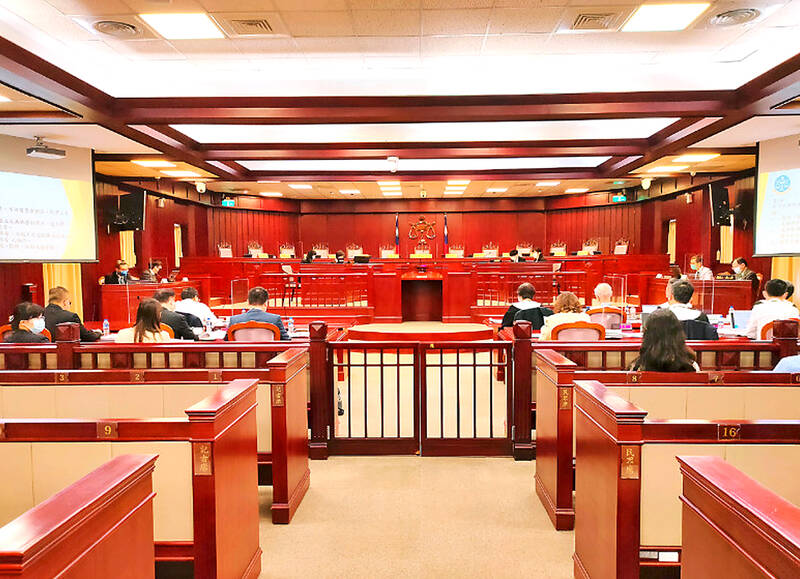The Constitutional Court in April is to hear oral arguments on whether the death penalty is constitutional, and a ruling is to be made in three months, with an extension of two months allowed if needed, it said on Thursday.
Thirty-seven death-row prisoners have filed a petition for a ruling on whether the death penalty is unconstitutional based on the principles of the right to life, human dignity and proportionality.
The Constitutional Court said that it would review a petition filed in 2022 by Wang Xin-fu (王信福), the oldest man on death row in Taiwan, along with related cases filed by death-row prisoners, in an oral argument session to be held from 10am to 4pm on April 23.

Photo: Taipei Times file
The arguments could center on two questions.
The first is whether the death penalty, a legally prescribed punishment, is constitutional.
The court said it wants to clarify whether, in addition to the right to life, the death penalty infringes upon other rights protected by the Constitution, such as the right not to be tortured or the right to human dignity; whether the pursued goals of the death penalty system are constitutional; and whether there are other means of punishment and supplementary measures available if the death penalty is deemed unconstitutional.
The second question is if the death penalty is determined to be constitutional, whether the court should limit the types of crimes that it can be applied to.
The court said it would also seek clarity on whether the crimes that the petitioners were sentenced to death for are still constitutional and why, and whether the scope of criminal death sentences should be limited, as Article 19 of the Criminal Code stipulates that an offense is not punishable if it is committed by a person who has a mental disorder or disability, and the punishment may be reduced as a result of their capacity for judgement.
Under the Constitutional Court Procedure Act (憲法訴訟法), the verdict should be pronounced within three months after an oral argument, and an extension of two months is allowed when necessary.
The cases originally included three other death-row prisoners, but they had died of illnesses in detention centers, so their cases would not be reviewed this time.
As Judicial Vice President Tsai Chiung-tun (蔡炯燉), Grand Justice Tsai Tsai-chen (蔡彩貞) and Grand Justice Greg Yo (尤伯祥) have participated in the trials of death-row prisoners, they would not participate in the hearing, the Constitutional Court said.

SECURITY: As China is ‘reshaping’ Hong Kong’s population, Taiwan must raise the eligibility threshold for applications from Hong Kongers, Chiu Chui-cheng said When Hong Kong and Macau citizens apply for residency in Taiwan, it would be under a new category that includes a “national security observation period,” Mainland Affairs Council (MAC) Minister Chiu Chui-cheng (邱垂正) said yesterday. President William Lai (賴清德) on March 13 announced 17 strategies to counter China’s aggression toward Taiwan, including incorporating national security considerations into the review process for residency applications from Hong Kong and Macau citizens. The situation in Hong Kong is constantly changing, Chiu said to media yesterday on the sidelines of the Taipei Technology Run hosted by the Taipei Neihu Technology Park Development Association. With

CARROT AND STICK: While unrelenting in its military threats, China attracted nearly 40,000 Taiwanese to over 400 business events last year Nearly 40,000 Taiwanese last year joined industry events in China, such as conferences and trade fairs, supported by the Chinese government, a study showed yesterday, as Beijing ramps up a charm offensive toward Taipei alongside military pressure. China has long taken a carrot-and-stick approach to Taiwan, threatening it with the prospect of military action while reaching out to those it believes are amenable to Beijing’s point of view. Taiwanese security officials are wary of what they see as Beijing’s influence campaigns to sway public opinion after Taipei and Beijing gradually resumed travel links halted by the COVID-19 pandemic, but the scale of

A US Marine Corps regiment equipped with Naval Strike Missiles (NSM) is set to participate in the upcoming Balikatan 25 exercise in the Luzon Strait, marking the system’s first-ever deployment in the Philippines. US and Philippine officials have separately confirmed that the Navy Marine Expeditionary Ship Interdiction System (NMESIS) — the mobile launch platform for the Naval Strike Missile — would take part in the joint exercise. The missiles are being deployed to “a strategic first island chain chokepoint” in the waters between Taiwan proper and the Philippines, US-based Naval News reported. “The Luzon Strait and Bashi Channel represent a critical access

Pope Francis is be laid to rest on Saturday after lying in state for three days in St Peter’s Basilica, where the faithful are expected to flock to pay their respects to history’s first Latin American pontiff. The cardinals met yesterday in the Vatican’s synod hall to chart the next steps before a conclave begins to choose Francis’ successor, as condolences poured in from around the world. According to current norms, the conclave must begin between May 5 and 10. The cardinals set the funeral for Saturday at 10am in St Peter’s Square, to be celebrated by the dean of the College